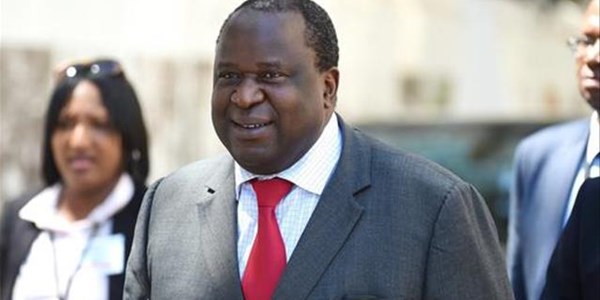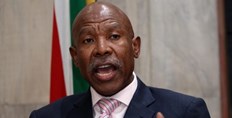Business
Mboweni unveils R2 trillion #Budget2021─── 15:05 Wed, 24 Feb 2021

Every national budget, in every nation across the globe, is a balancing act.
But this year, with the ravages of COVID-19 and the associated lockdowns eroding an already shaky economy, the Finance Minister and his team at Treasury have a particularly hard task.
Treasury has had to rein in government spending and show clearly that the days of willy-nilly taxpayer-funded bailouts to badly managed SOEs are over; that they are serious about trimming the fat, and ensuring government spends efficiently, while simultaneously ensuring they spend enough to help the most vulnerable in society keep the wolf from the door.
The ravages of the pandemic and the associated lockdowns have driven the country into recession, but Treasury is predicting the beginning of a turnaround this year, with a forecast real GDP growth of 3.3% this year, and 2.2% for 2022. While these figures are much higher than previous years, the South African economy is coming off a very low base – battered by the effects of the global pandemic and prolonged hard lockdowns. Treasury expects the economy will only get back to pre-pandemic levels (which weren’t exactly stellar), in the latter part of 2023.
We’re deeper in debt this year than we’ve ever been before – with a debt-to-GDP ratio of 80.3%. That figure will increase in the next two years, eventually predicted to stabilise at around 88.9% of GDP in 2025/26.
On average though, over the next three years, government will spend twenty cents out of every rand it collects just to service the interest on debt. To put our debt situation in perspective, over the next three years, government will spend more on debt service costs than it will on health, or on community development, or on safety.
The consolidated budget deficit is set to reach record levels this financial year, at 14% of GDP, but Treasury believes it can knock this down over the coming years, and is on track to reach its target of achieving a primary fiscal surplus in 2024/25 – that means we’ll be collecting enough revenue as a nation, to cover our non-interest related costs.
There’s a lot that government can’t control – the progress of the pandemic globally is one of those unknowns, and that makes for an uncertain economic outlook.
VACCINES FOR THE WIN
A lot of what Treasury, and government in general, wants to achieve is dependent on keeping the coronavirus in check. Surges, and the lockdowns that follow, are repeatedly cited as major risks, not only to economic recovery, but to all the individual factors that tie into recovery – revenue collection, growth and job creation.
The Health Minister has said on numerous occasions that there is no upper limit for spending on the vaccine procurement programme, and Treasury has allocated R9 billion to funding the vaccine rollout over the medium term.
The bulk of this money – R6.5 billion – will be allocated to the National Department of Health to buy and distribute the vaccine doses, with R2,4 billion allocated to provinces to help them distribute and administer the vaccines.
The Medical Research Council also gets a R100 million injection for vaccine research, and the government communications department will preside over a R50 million allocation to run mass communications campaigns around the vaccine rollout.
During the course of this year, Treasury has allocated R1.3 billion specifically to purchase vaccine doses, but because there’s still a lot that’s uncertain about final costs, and the nation is under the gun, chasing an end of year deadline to get 67% of the population vaccinated, Treasury has also identified another R9 billion that could be drawn from the contingency reserve and emergency allocations.
So, in total, the available funds for vaccine procurement and rollout in the medium term amounts to around R19.3 billion.
At several points in the Budget Review document, Treasury makes the point that a slick and well-run vaccine rollout will knock on positively to growth and recovery prospects, whereas a stop-start rollout will retard the recovery process.
Apart from COVID measures, Treasury priorities include stabilising the supply of electricity, embarking on partnerships with the private sector, and actively supporting industries with the potential to employ people en masse.
Part of the driving force behind this is the operation dubbed Vulindlela – an effort to support structural reform within government structures.
WHAT WE’RE SPENDING
In total, government plans to spend R2 trillion each year over the next three years.
Social spending, as usual, gets the lion’s share.
Learning and culture gets R402.9 billion, Social development R335.2 billion and Health R248.8 billion.
There is also a provisional allocation totalling R11 billion for the public employment initiative, which hopes to create another 180,000 jobs by March, to add to the running tally of 430,000 jobs.
The Temporary Employer/Employee Relief Scheme (TERS) extension announced by President Cyril Ramaphosa in his State of the Nation Address is also provided for.
Treasury documents also update the efforts to reduce the unsustainable public wage bill.
Department of Public Service and Administration is tasked with bringing the spending under control, and in order to conduct reviews on personnel spending, R19 million has been found from elsewhere in the Budget, to be spent over the next three years.
The Department of Public Enterprises has also found almost R41 million to reprioritise, in order to start the State-Owned Enterprises Council, announced in the State of the Nation Address earlier this month. That body is meant to advise government on repositioning state-owned companies, and developing legislation to strengthen governance at such bodies.
Treasury has also found a total of R9 billion over the next three years, through reprioritising budgets to recapitalise the struggling Land Bank.
That is the only new bailout or lifeline to a struggling state-owned entity.
SOCIAL GRANTS
For those who rely on social grants to get by, their increases will not even keep up with inflation.
The state pension, disability grant and care dependency grant increase by just R30 per month, the child support grant by R15 a month, and the foster care grant by a mere R10 per month.
And Treasury says grant recipients can expect more of the same in the years to come, with below-inflation increases expected to continue. In fact, over the next three years, government plans to reduce the social grant budget by 2.2%, and simultaneously make the available money stretch further, as another 300,000 beneficiaries are added over the same period.
For the moment though, a provision of R2.1 billion has been made to extend the special, emergency COVID-related grant until the end of April.
The Department of Women, Youth and Persons with Disabilities will also get R15 million over the next three years to start and run a national council to deal with gender-based violence and femicide.
The National Youth Development Agency has been allocated R1.4 billion for its operations and to run its youth employment support programmes.
TAXES
Needless to say, the pandemic, the associated lockdowns and the global slowdown has severely affected SARS revenue. However, there’s some good news in that the under-collection of revenue is not quite as bad as was predicted in the Medium Term Budget Policy Statement (MTBPS) last October.
At that stage, the shortfall was so great that in June last year, during the Special Adjustments Budget, tax increases totaling R40 billion were proposed.
Whilst tax revenue will fall almost 11% short of last February’s predictions, collections have rebounded better than expected, yielding almost R100 million more than what was predicted in the MTBPS in October.
That recovery means the tax proposals tabled in June have been withdrawn.
SARS isn’t imposing any new taxes this year, but there are some changes on the cards.
Treasury is still working towards lowering the corporate tax rate, a project they embarked on last year in an effort to bring South Africa in line with other global players, and make it a more attractive place to do business. The idea was always to do this in a way that didn’t cause a sudden drop in revenue.
The ceiling for contributions to UIF will be set from 1 March – at R17,711.58 per annum.
And Treasury is also planning to relook travel and home office allowances, and the rules around salary structuring, after the pandemic forced many to embrace the work from home lifestyle. Don’t expect much immediate movement on this though – it’s likely to be a project run over several years, with consultations only starting this financial year.
SINS, FUEL LEVIES AND TAXING THE DIGITAL ECONOMY
Once again this year, you’ll be paying more for your sins, and in spite of calls from the alcohol and tobacco industry to ease excise duties on booze and tobacco, government plans to raise them by 8% for 2021/22.
That means a 340ml can of beer or cider goes up by 14 cents, wine goes up by 35 cents a litre, sparkling wine by R1.15 a litre, and spirits by R5.50 for a 750ml bottle.
The price of cigarettes also goes up, by R1.39 for a pack of 20.
Last year, for the first time, SARS introduced an excise duty on heated tobacco products – e-cigarettes and vapes. This year they are changing the way they tax them to bring them in line with traditional cigarettes. So, products that are normally sold in packs of 10 or 20 sticks will be taxed accordingly, at a rate of 75% of the rate applied to a pack of cigarettes.
There’s also an increase in the fuel levies on the cards, so you can expect to pay 15 cents a litre more in levies starting from April this year. That increase is inflation related, but the Road Accident Fund levy rises by 11 cents a litre – an above-inflation increase. So as of April, expect to pay a total of 26 cents a litre more to fill up your car.













